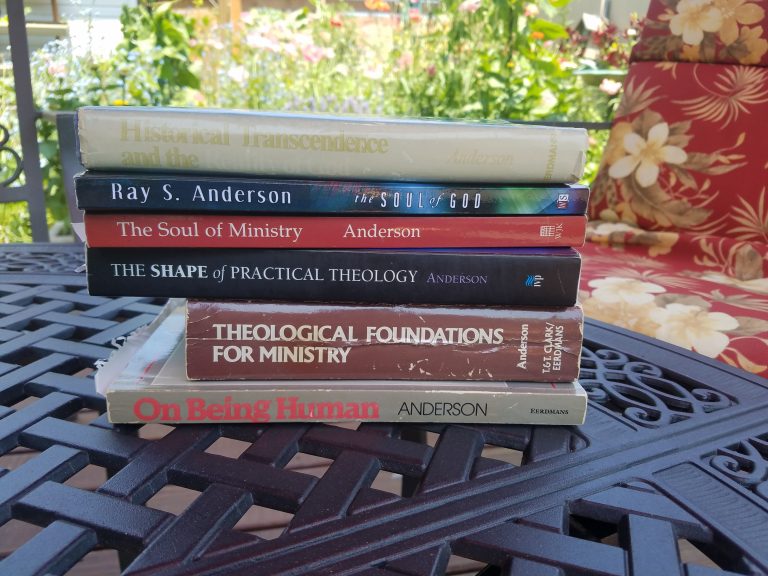
Not Bill Gates’ Summer Reading List – Reading Ray Anderson
July 3, 2020 Roland Kuhl 0 Comments
When I was pastoring I often had the opportunity to take a few weeks in the summer for a reading sabbatical. I would sit on the shore of Lake Superior in a beach chair, umbrella overhead and digging through a book on mission, theology, or even ethics – focused on what it means to live Christianly, incarnationally, humanly in our world – seeking to embody the way of Jesus in who I am and how I live.
Since, I have been out of pastoral ministry, at least in the traditional sense – my pastoring now brings me to people who hardly are ever in church anymore, but nevertheless seeking God, seeking what it means to live with meaning in the world, I have missed these summer reading sabbaticals. With this being the summer of Covid-19, more or less staying at home, venturing out only to get groceries and get home improvement supplies from Menards (seems to be an opportune time to landscape our backyard oasis), I find myself often sitting in one of my comfortable chairs on my deck amid our backyard hosta (over 85 varieties of hosta) and wildflower garden with umbrella overhead. It’s a good time to reinstate my summer reading sabbatical.
Over the past few weeks I have been drawn back to the writings of one of my seminary professors who became more and more a mentor to me over the years of my involvement in pastoral ministry – Ray S. Anderson. Over the years my involvement in ministry has been shaped by his theological insights in which I have sought to be incarnational, missional and participate with God who is actively engaged in our world revealing and reconciling and making all things new. The work that drew me back into reading Anderson was The Shape of Practical Theology: Empowering Ministry with Theological Praxis (InterVarsity, 2001), and over the years I have read many of his other works including The Soul of God: A Theological Memoir (2004).
His thinking has shaped much of my ongoing ministry praxis – understanding that all ministry is God’s ministry and that ministry precedes theology – God’s creative and redemptive actions precede our response to God, and in fact, we can only fully respond to God, as we respond through Christ Jesus, who through his incarnation (embodying our humanity), is both the revelation of God to us (revealing that God is like Jesus) and the who humanly responds to God on behalf of all humanity. In this way, we are not only “in Christ” as Paul writes in Galatians 2:20, but we also continue the ministry of Jesus in the world in the presence and power of the Spirit, which was not his own ministry, but the ministry of the God the Father, who sent Jesus into the world. Not only is all ministry God’s ministry, all ministry is also Christopraxis – rooted and centered in and through Jesus Christ.
Oddly enough, what I have not read of Anderson’s work was the publication of his dissertation, Historical Transcendence and the Reality of God (Eerdmans, 1975). Perhaps, I never delved into it because dissertations can be challenging to slog through (and Anderson is not necessarily an easy read, nor was he easily understood when I had him as a theology prof back in the early 80s – it took me about 3 weeks to begin to understand where he was coming from. However, when I did, it began to change my understanding – though it would take a number of years for his theological project to shape my praxis of ministry).
I am finding I am pondering questions that have been raised by students I have taught in an undergraduate theology course at a Franciscan university. Many of these are done with church, perhaps even done with God, seeking to find meaning in life outside of religion. In engaging them in class, their questions have led to discussions that raise questions to them – such as, why assume that God is encapsulated in a religious frame or box, why think of God only in religious terms? Is it possible for there to be a religionless faith, a religionless Christianity, perhaps, even a religionless theology?
These were similar questions Bonhoeffer was raising through his Letters and Papers from Prison, theological reflections prior to his execution by the Nazis in 1945. Delving into Bonhoeffer led me back to Anderson, whose dissertation research was focused on these questions of Bonhoeffer, these questions raised by students in my undergraduate course on theology.
And so, I sit on my deck, in a deck chair, umbrella overhead, isolated amidst Covid-19, opening up Anderson (reading, reflecting) and opening up new understandings and connections for what it means to embrace the way of Jesus – living and acting incarnationally, missionally, and seeking to participate with God in God’s reconciling activity/ministry in our broken world – which happens to be even more currently relevant, as we respond to a renewed awareness of the depths of racism rooted in the DNA of our American identity (sparked by protests and renewed discussion in response to the killing of George Floyd by a Minneapolis police officer while other officers looked on), engaging in conversations and actions in which we seek to foster reconciliation in the manner of Jesus, by seeking to become anti-racist and more fully embrace the kind of humanity that Jesus makes real (which I reflect on further in future posts).